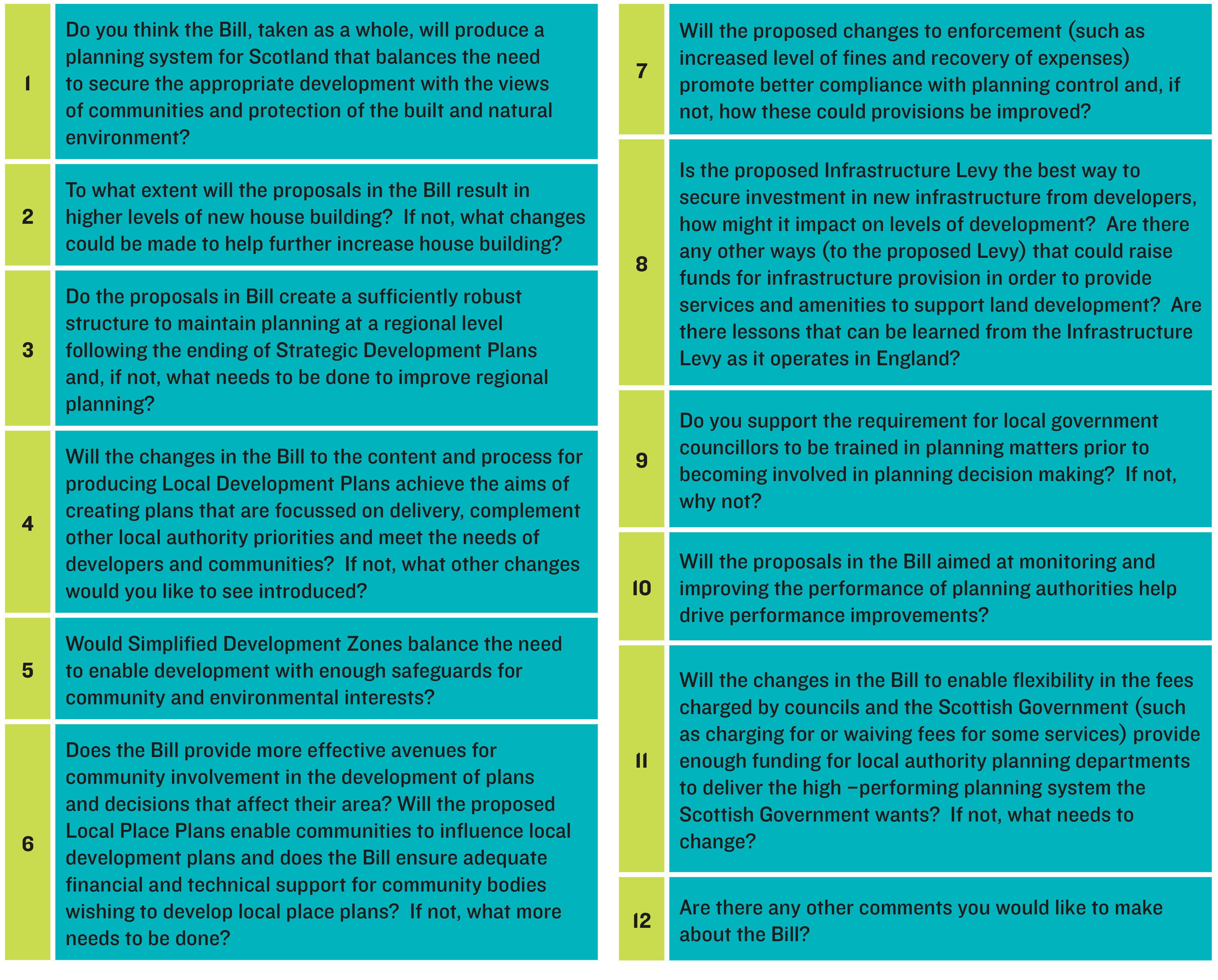January 2017 saw the Scottish Government set out its thoughts on how it would like to reform the Scottish planning system, in the consultation on ‘Places, People and Planning’. So, here we are one year on and the Planning (Scotland) Bill has been introduced into Parliament; the Scottish Parliament’s Local Government and Communities Committee has also launched a call for written evidence , with a deadline of 2 February 2018.
I was delighted to be part of one of the six Working Groups – mine was on housing - that contributed to the debate. But, am I delighted with the conclusions and outcomes of the review, as manifested in the Bill? Read on and find out…
The Scottish Government expects the Bill to “improve the system of development planning, giving people a greater say in the future of their places and support delivery of planned development”.
The Local Government and Communities Committee is looking for submissions on the Bill and while they will take views on any aspect, they have set 12 questions that they are specifically seeking opinions on. These are set out at the end of this blog.
Meanwhile I have set out a summary of my thoughts with a particular focus on the proposed statutory development plan reforms.
In terms of statutory development plans, the Bill will, on the face of it, make it much more difficult for individuals to be directly involved in their shaping and the development industry seems to have been all but cut out of the process.
At present, the statutory development plan is made up of the strategic development plan (SDP) (where applicable) and the local development plan (LDP). These are both prepared through an initial 3 stage approach, with each stage having an element of engagement / consultation. Under the proposed approach (which will only apply to LDPs as SDPs are to be revoked), it appears that the Stage 1 engagement in evidence-gathering will remain but that there will be no consultation on the outcomes/conclusions of that evidence-gathering exercise. Currently, the Main Issues Report allows consultation on this as a Stage 2 in the process but this stage is to be replaced. An Evidence Report is now to be prepared instead, that will be tested in terms of sufficiency by the Scottish Government through a “gatecheck”. Unless the “gatecheck” process is opened up to include interested parties in the agreeing of the evidence base for the proposed Plan, there will be no scrutiny of it other than by Scottish Government. From the recently provided Scottish Government Flowcharts it seems that the only time consultation will occur on the LDP will be at Stage 3. This will be at ‘Proposed Plan’ stage and only after the draft Plan has been approved by the Full Council of the Planning Authority.
While I agree that the LDP should reflect local outcome agreements and essentially be their spatial manifestation, it is a concern how the views of individuals will be facilitated through this process - unless they have the wherewithal to produce their own ‘Local Place Plan’ to which the LDP will have to accord. Clearly some communities and individuals will be significantly disadvantaged by this approach. For example, some would clearly be able to participate in a Main Issues Report consultation and express their views on an emerging plan but couldn’t commit to the preparation of a Local Place Plan themselves.
A significant element of consultation is proposed to be lost from the system, and scrutiny from the development industry seems to be prevented until after the evidence has been agreed and the draft Plan has been written and approved. It appears too that actual consultation on the Plan is to be limited to 8 weeks, once the proposed Plan has been approved by the full Council of the planning authority. Is there therefore not a danger that this new process could be undertaken entirely behind closed doors, until such times as the local planning authority agrees the Plan they would like to adopt (the Proposed Plan)? Consultation is allowed then - but surely this is too late for there to be any meaningful input?
So, unless you are somehow involved in a ‘Community Planning Partnership’ and the forming of local outcome agreements, or you have the means, time and inclination to be involved in the preparation of a local place plan then your influence on the plan making process is reduced to one round of consultation once the local planning authority has agreed the draft Plan. This is ironic, given one of the stated objectives of the Bill is to “improve the system of development planning, give people a greater say in the future of their places and support delivery of planned development”. In addition, and given that the development industry will deliver most of the planned development, it is unclear how delivery can be ensured without their involvement throughout the development of the Plan.
Papers supporting the Bill state that “plans must be based on a robust and transparent evidence base, informed by open and democratic debate and have a clear path to delivery”. It is extremely unclear how this will be achieved, given the new proposed process where there is no early scrutiny of plan evidence, other than by Scottish Government.
This leads to a further concern that the system is set to become very ‘top down’.
The National Planning Framework (which is to incorporate Scottish Planning Policy) will continue to be prepared by Scottish Government and will - along with the LDP - form the statutory development plan for an area. This increases the status of the National Planning Framework, as it is currently not part of the development plan for an area (Section 24 of the Town and Country Planning (Scotland) Act 1997). It is indicated that the National Planning Framework will be where future Development Policy is set out, a small amount of locally distinct policy only will be set out in the LDP. It is not clear how the views of communities, or the development industry, will influence the making of the Framework but it seems clear that the bulk of planning policy with which future development is to accord will be set by Scottish Government, rather than at a local level. Scottish Government will also test whether a local authority’s evidence base for their LDP is sufficient and ultimately will approve LDPs which all in all will only have been through one round of local consultation, right at the end of the process.
Surely this lack of scrutiny is not acceptable to the development industry, nor the wider sector. Time is running out to influence the content of the Bill at this stage. Don’t pass up this chance to have your say. If the Scottish development industry makes submissions en masse then perhaps the proposed process can be revised to ensure an open and transparent “gatecheck” – say with a round table debate on the issues that the emerging Plan needs to address before it is too late.
Finally, there also needs to be real and meaningful involvement in the delivery plans by the development industry if these are to properly reflect what is achievable over what timescale – proper assessment of deliverability and viability is essential for the successful delivery of any plan.
Call for Evidence submissions have to be made by 2 February 2018. [If you are concerned about the impact the Bill’s changes may have on your business, Lichfields can help you make submissions. Please contact me to discuss.
If you want to hear more on the Bill, Lichfields and Anderson Strathern are hosting a breakfast seminar on 18 January. Follow this LINK for further details and to register for the event.





